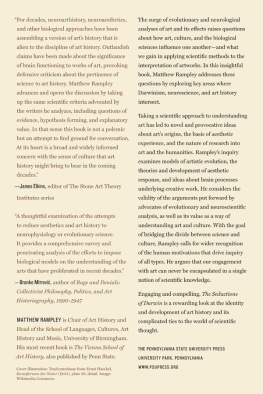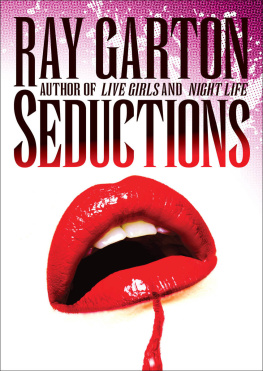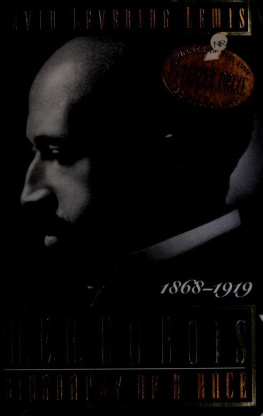THE SEDUCTIONS
OF BIOGRAPHY
CULTURE WORK
A Book Series from the Center for Literary and Cultural Studies at Harvard
Edited by Marjorie Garber
Media Spectacles
Marjorie Garber, Jann Matlock, and Rebecca L. Walkowitz, Editors
Secret Agents:
The Rosenberg Case, McCarthyism, and Fifties America
Marjorie Garber and Rebecca L. Walkowitz, Editors
THE SEDUCTIONS
OF BIOGRAPHY
Edited by
Mary Rhiel and David Sucboff
First published 1996 by Routledge
Published 2016 by Routledge
2 Park Square, Milton Park, Abingdon, Oxon 0X14 4RN
711 Third Avenue, New York, NY 10017, USA
Routledge is an imprint of the Taylor & Francis Group, an informa business
Copyright 1996 by Routledge
All rights reserved. No part of this book may be reprinted or reproduced or utilised in any form or by any electronic, mechanical, or other means, now known or hereafter invented, including photocopying and recording, or in any information storage or retrieval system, without permission in writing from the publishers.
Notices
Practitioners and researchers must always rely on their own experience and knowledge in evaluating and using any information, methods, compounds, or experiments described herein. In using such information or methods they should be mindful of their own safety and the safety of others, including parties for whom they have a professional responsibility.
Product or corporate names may be trademarks or registered trademarks, and are used only for identification and explanation without intent to infringe.
Outing History from Out Magazine, February-March 1994, by Blanche Wiesen Cook. Copyright OUT Publishing. Reprinted with permission. Inventing and Interpreting Malcolm X from The New York Times Book Review, 29 November 1992, by Michael Eric Dyson. Copyright 1992 The New York Times Company. Reprinted with permission. Bisexuality and Celebrity from Vice Versa, by Marjorie Garber. Copyright 1995 Simon and Schuster. Reprinted with permission. Taking a Life from Signs 20, by Doris Sommer. Copyright 1995 The University of Chicago Press. Reprinted with permission.
Library of Congress Cataloging-in-Publication Data
The seductions of biography / edited by Mary Rhiel and David Suchoff.
p. cm. (Culture work)
Includes bibliographical references and index.
ISBN-13: 978-0-415-91089-7 (hbk) ISBN-13: 978-0-415-91090-3 (pbk)
1. Biography as a literary form. I. Rhiel, Mary. II. Suchoff, David Bruce.
III. Series.
CT21.S42 1996
814.009492dc20 | 95-25777
CIP |
Contents
William S. McFeely
Mary Rhiel and David Suchoff
Part One
MASS MEDIA, BIOGRAPHY, AND CULTURAL MEMORY
K. Anthony Appiah
Marjorie Garber
Marita Sturken
Michael Eric Dyson
Part Two
PRIVATE LIVES, PUBLIC FIGURES
William S. McFeely
John DEmilio
Blanche Wiesen Cook
Maurice Isserman
Part Three
CHANGING THE SUBJECT
Betty Sasaki
Richard J. Powell
Jeffrey Louis Decker
Hay den Herrera
Part Four
WHOSE LIFE IS IT, ANYWAY?
Barbara Johnson
Diane Wood Middlebrook
Phyllis Rose
Jean Fagan Yellin
Doris Sommer
Part Five
POSTMODERNISM AND THE POSSIBILITY OF BIOGRAPHY
Marjorie Garber
Sherley Anne Williams
Marilyn L. Brownstein
Clark Blaise
THE LIFE STORY of this volume begins with the group of Andrew F. Mellon Faculty Fellows at Harvard University who gathered for one year of discussion and research on Biography: Jeffrey Decker, Maurice Isserman, Dennis Trout, and the editors of this volume contributed to that year of colloquy and fellowship and to the conference "Life-Likenesses: The Seductions of Biography that gave life to this volume. The pre-history of this biographical venture was made possible by the scholars who both seduced us into this project and supported us in it. The directors of the Mellon Faculty Fellows in 19921993Richard Hunt, William S. McFeely, Marjorie Garber, and Henry Louis Gates, Jr.co-planned that conference and made the selection of speakers and topics as cogent and pleasurable as we hope the resulting volume has turned out to be. We thank all the participants of that conference and those whose hard work and planning made it possible, especially the Andrew F. Mellon Foundation, Harvard Universitys W. E. B. DuBois Institute, and the Center for Literary and Cultural Studies at Harvard. Thanks are due as well to Jay Maclean, Andre Craddock-Willis, and Herrick Wales. Invaluable editorial life-support was provided in outstanding, timely, and professional fashion by Grace Von Tobel, Sarah Richmond, Judy Daviau, and Zarin Mistry of Colby College. We are also grateful to Paula Krog, for disk-doctoring beyond the call of duty, and to Eric Zinner, Stephen Magro, Christine Cipriani, and Bill Germano at Routledge for their invaluable assistance.
William S. McFeely
WHY BIOGRAPHY? This is a question that invites conjecture rather than strict definition. To begin with, biography is seductive. I like the treachery of that descriptive term, that wonderful word, and I invite you to follow its scent into the essays on biography which follow. In them there is room to explore the subject in intimate, uneasy ways without wasting time trying to achieve the unattainable: a definitive statement of what biography, or its cousin, autobiography, is.
But it is something. When we write a biography or read one, when we tell our own story or see ourselves in someone elses, we are embarked on what can be an exciting journey. Books and other biographical texts draw us into our culture. The silliest public-relations account of a rock singers life may expose more than had been bargained for. And, to be honest, the most serious of scholarly tomes can obscure quite as readily as the best of them can illuminate. This volume seeks to explore some of the ways in which biographies shed light.
There are, of course, those who see no light in the genre at all. Martin Amis, reviewing a biography of Philip Larkin, wrote: Biography, besides being a lowly trade, may also be attritional. Andrew Motion, the author of the Larkin book, had said in his rationale for the work, All good biographers insist on separation, as well as connection. Amis disagreed, No, what they do, or end up doing, is insist on connection. And Motion connects ad nauseam: obviously on the spur, the message for Ruth in these poems,and so on. Biographers may claim separation, but what they helplessly insist on is connection. What the hell are they doing day after day, year after year (gossiping? ringing changes on the Zeitgeist?), if the life doesnt somehow account for the art?1
Closing her study of an artist, Ruth Butler, author of Rodin: The Shape of Genius, writes, After seven years of steeping myself in the long and vivid life of Auguste Rodin, I searched for one word that might encapsulate it for me. The word that fits best is lonely.2 I doubt Butler could claim that Rodins loneliness would account for his art in a way that would satisfy Amis or anyone else. But she does suggest that Rodins loneliness gave the artist space in which to create one of the great biographical statements of our culture, his Balzac.






